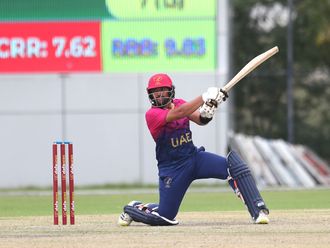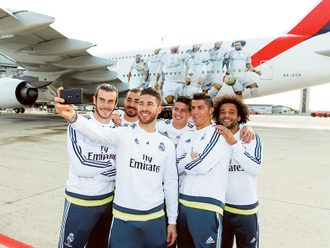London: As he headed to Merion’s first tee for the 18 holes that would define him, Justin Rose received a text message from his coach, Sean Foley.
It read simply: “Be the man your dad taught you to be, the man your kids can look up to.” If this sounds like implausibly celestial scripting, then it pays to recall the US Open champion’s resonant gesture as he departed the final green, pointing to the skies in explicit acknowledgement of his late father Ken.
“I laid everything out there,” Rose reflects. “I suddenly felt as if I was the player he had dreamt I would become.”
The sense of their enduring bond had been gathering all weekend. “Driving to the course on Saturday, I saw myself in the rear-view mirror,” he says. “And I remembered something my dad used to do. He would study my eyes and, on a good day, tell me: ‘Yeah. You’re looking good’.”
Rose plainly reached the same verdict. For he would soon be anointed as the first English winner of America’s national championship for 43 years, bringing to fruition every drop of the potential he had announced at Royal Birkdale as that cherubic teenager in the baggy red sweater.
Aptly, in the five-minute window between the realisation of victory and the trophy presentation, he called his mother Annie back in Hampshire. “You can’t help it, the tears. I was sobbing like a little boy. It was a moment she had imagined for me as much as I had for myself.”
Rose’s casting for the Open at Muirfield this week, 15 years on from his famous first, could hardly be different: from the unknown 17-year-old to world No 3 and would-be serial major winner. And yet for all the accoutrements of his elevation, from the house in Orlando’s Lake Nona enclave to the mansion he part-owns in the Bahamas, he still detects the wisdom of his father being imparted from beyond the veil.
One can rest assured, for example, that had have every East Lothian dune committed to memory in advance of his Open test, allowing for vagaries even the Honourable Society of Edinburgh Golfers scarcely know exist. It is this meticulousness that he owes solely to the teachings of Ken, who died of cancer in 2002, aged 57.
“We would practise the types of shots required for a particular course,” Rose explains. “He worked me heavily on mental imagery. I can still hear him saying: ‘Jus, give me that Radcliffe-on-Trent nine-iron.’ The McGregor Trophy for Under-16s was played there, and I had hit a nine-iron to put me seventh in the tournament when I was 12. Quickly we built up a library of shot-making.
“Even from a nutrition point of view, he made sure I had jaffa cakes in the bag, because he knew they were a good source of energy. It wasn’t exactly scientific — I wouldn’t touch one during a round now — but he was thinking along the right lines, and that’s why I advanced much quicker than most kids my age.”
Armed with this exacting method, since refined by Foley and a veritable battalion of specialist coaches, Rose navigated a near-seamless path through Merion’s enigmatic variations, peppering its quaint wicker baskets. The US Open, as has grown traditional, ended on Father’s Day, and while that coincidence has often been magnified to saccharine levels by the American networks, the symmetry captured both Rose’s personal loss and his belief in the ties that bind.
“To me there are two standout emotional moments in my career,” he argues. “The first was winning my first tournament at Woburn in 2002, when he was there on the ground, and the second at Merion, where I reconnected to him at a much deeper level than I ever had, since he passed away. It was the first time I really felt as if someone was there. I might as well have hugged him on the green.”
The memories of Rose Senior, proudly cheering as his son holed an astonishing second shot at the last at Birkdale to finish fourth in the Open, would have been equally acute when he embarked upon his latest quest for the Claret Jug. Remarkably, that spectacular teenage flourish remains the highlight at his home major for Rose, who has failed to finish in the top 10 since. But the catharsis of his US Open triumph has allowed him, at 32, a certain equanimity, enabling him to regard the madness of ‘98 with greater perspective.
“I was always trying to live up to ‘98, being the new hope of British golf,” he admits. “Clearly that was a burden I couldn’t carry for the first part of my career.”
That is rather an understatement. Turning professional in the heady afterglow of his Open exposure, Rose proceeded to miss 21 cuts in succession, a sequence that could have frayed the will of a lesser man.
“What saved me, in the middle of that period, was the ability to perceive the small victory. If I missed the cut by six shots one week and by four the next, I would spin it in a positive light.”
He eulogises the contribution of Foley, psychotherapist Dr Gio Valiante and short-game coach David Orr to his US Open triumph. One significant change post-Merion has been to add Mark Steinberg, Tiger Woods’s long-time agent, to his camp.
He is at pains, though, to point out that the decision reflected no ‘big-time’ behaviour on his part. “Commercially, things have changed,” he says with a shrug. “Life gets busier.”
Rose is of the conviction that everybody has their time and that Merion, where he stood for what seemed an age lining up that decisive four-iron to glory, was his. “I walked over the crest of the hill, and saw the ball in the middle of the fairway,” he remembers.
“The image of Hogan in 1950 occurred to me. I even closed my eyes, because I didn’t want to get outside my bubble. All I told myself was: ‘This is your moment — the iconic shot at Merion. This is your chance, your turn, your time.” And so, to the elation of all who had restlessly awaited Rose’s coronation, it was. How his father, recipient of that pointed signal to the heavens, would have loved it.
— The Telegraph Group Limited, London 2013







